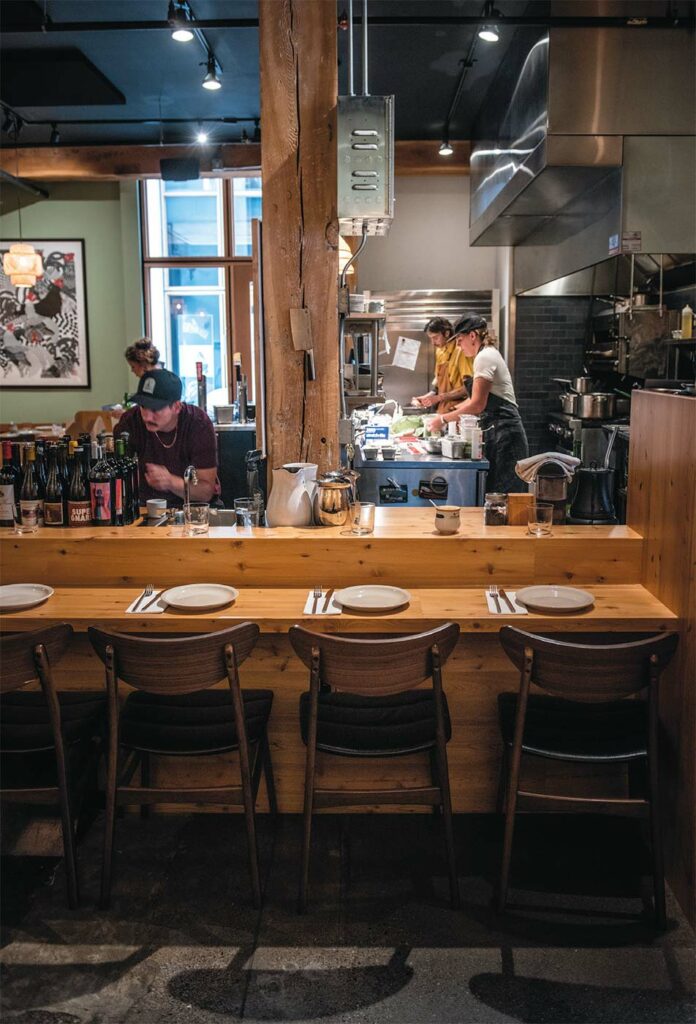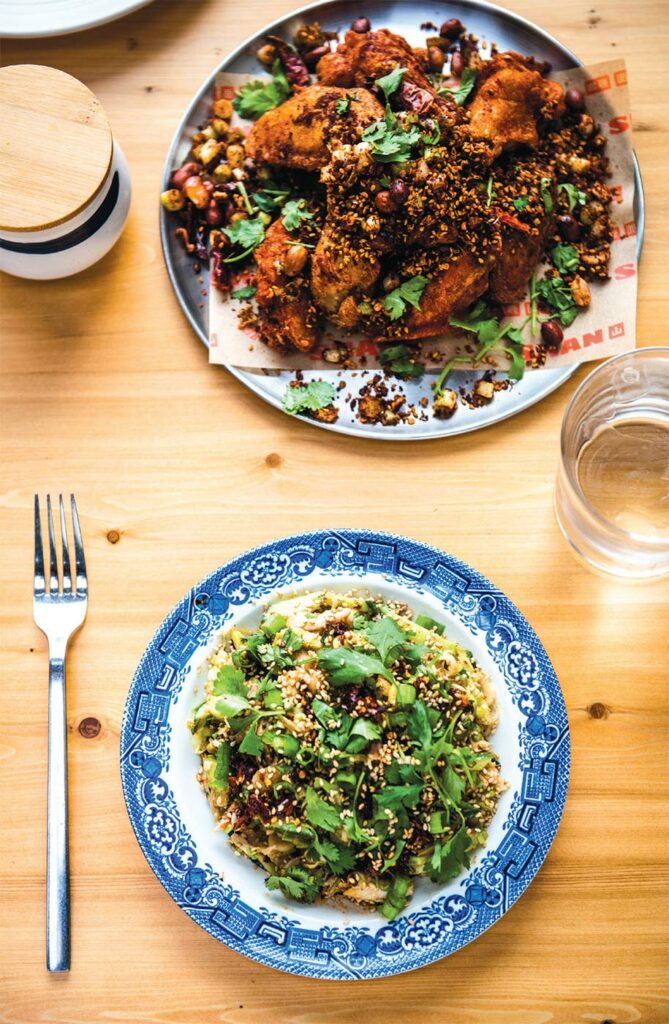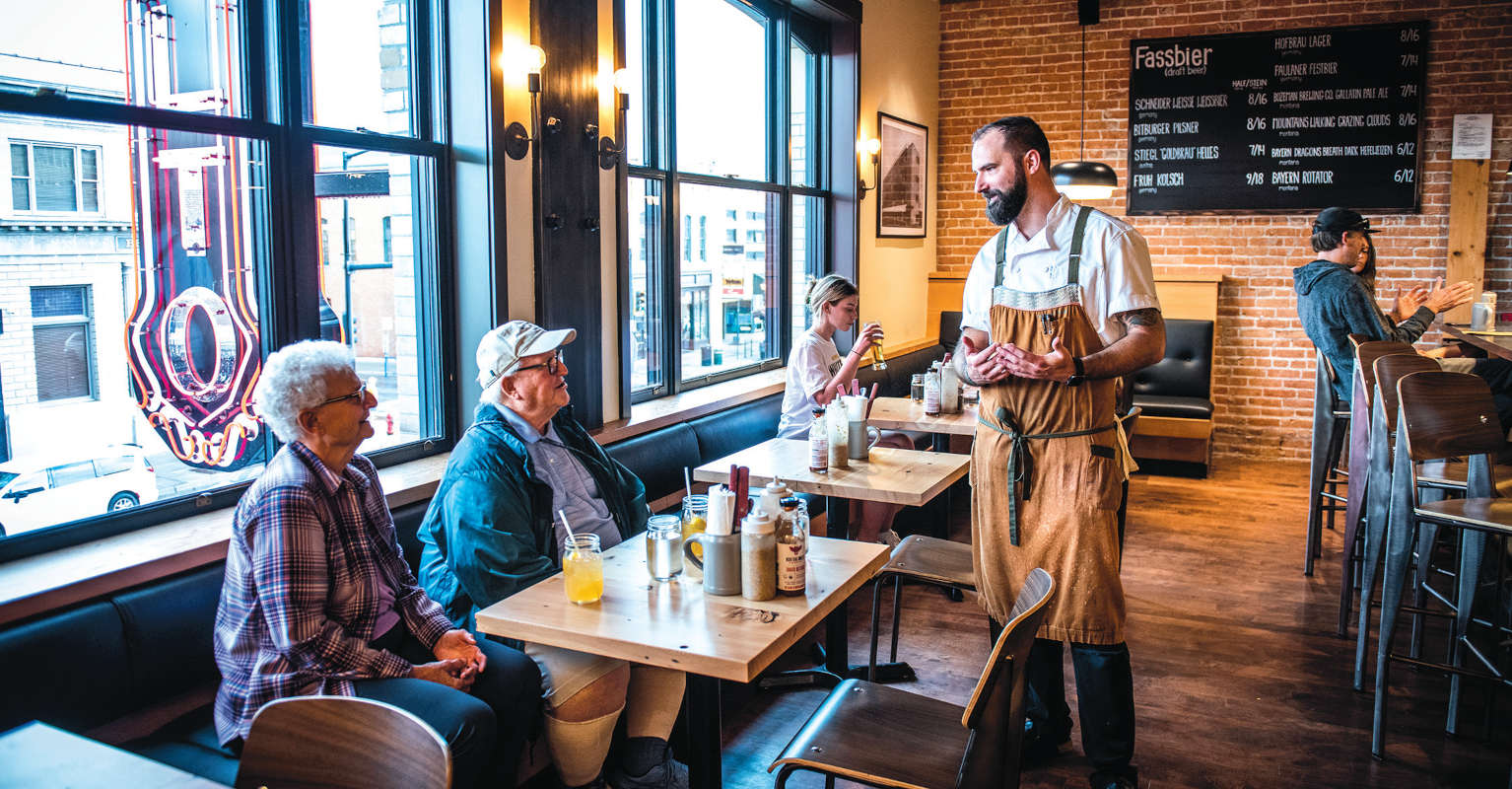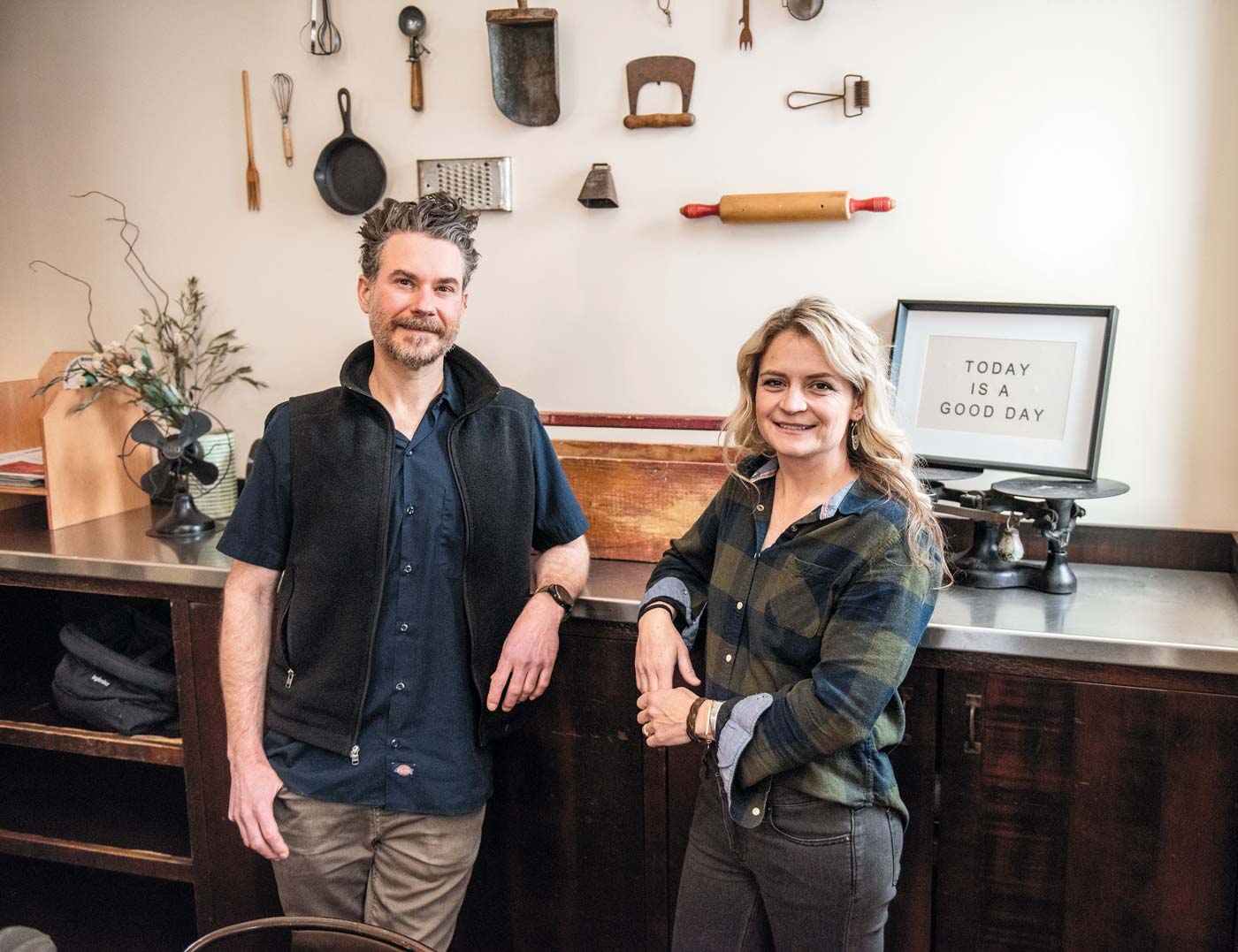Shan Serves Up Asian Cuisine
It is an hour before dinner service at Shan, and the atmosphere is buzzing: Chefs work to the beat of banging music, tables are set with precision, lights are low, candles are lit—all in anticipation of a fully booked evening. Shan opened in April and occupies a space in Bozeman’s Cannery District at 109 E. Oak St. The room is small but mighty, with little tables, high ceilings, and low-hung bamboo pendant lights all surrounding an open central kitchen that provides views of the busy action on the chef line.
The plates delivered from the kitchen match the vibe: smaller, shareable portions that are bursting with flavors so unique it’s hard to pinpoint any one ingredient. Chef and owner Jarrett Wrisley delivers each dish with a passion that speaks to his love for the food and local ingredients, as well as his love for the countries in which he has lived.
Wrisley’s story unfolds like an adventure novel: After studying Mandarin at Colegate University in New York, he traveled to Taiwan and Beijing. “I was always interested in Asia and the Himalayas,” he says. “I wanted to lose myself in China and to be free and independent.”
After traveling 5,000 miles across the country for the trip, he was hooked, and three years later he moved to China as a writer and teacher. While he quickly learned that teaching wasn’t for him, he found a home in writing and was published in That’s Shanghai, a food and drink magazine. This led to freelance jobs with Food & Wine, Travel + Leisure, and National Geographic.
“Being a freelance journalist was dangerous at that time,” Wrisley says, adding that in 2008 he moved to Thailand, having found China to be a difficult place to live and work as a freelance journalist. In Bangkok, he continued to write features about food for The Atlantic Monthly.

While Wrisley wrote, he also became a student of the food and began to study and apprentice under Thai chefs. During this time, he noticed a gap in the Thai restaurant industry: There were bland, expensive hotel restaurants catering to tourists, and there were cheap, local street-food joints, but nothing in between. So, he decided to fill the niche by opening a restaurant in 2010 called Soul Food Mahanakorn on Soi Thonglor in Bangkok.
“The menu was produce-focused with a great cocktail menu and wine program,” he says. It became a place where people gathered to eat regional Thai food crafted with local organic produce. “It was a vibey joint that turned into a party many nights.” The restaurant garnered a lot of press, and soon he was opening a second in Bangkok, then a third in Hong Kong. These were followed by opening two regional Italian restaurants with chef Paolo Vitaletti.
Everything came to a halt in December 2019 with the first wave of the COVID pandemic. “Our area was the first place outside of China where COVID was discovered,” Wrisley says. “It was like a nuclear site.” Immediately, he had to close all of his restaurants, and the Thai government had a difficult time developing strategies to support small businesses. That period of time was heart wrenching for Wrisley, who had worked so hard to create multiple successful businesses intertwined with many communities of staff and customers. When the restaurant shuttered for the last time, he swore off restaurant work, though he remained co-owner of the two Italian joints.
“Money was running out fast, and I realized we would lose everything we had,” he says. “I never even visited the Hong Kong restaurant again. It was like having a relationship with a person, and it was suddenly over.”
Part of Wrisley’s healing process was moving back to the U.S. with his wife, Candice Lin, and their 4-year-old son to spend time with family on the East Coast, but he knew his soul would need the mountains, woods, and nature. They loaded their old Subaru and spent four months driving across the Mountain West looking for a place to land. When they drove through Bozeman, and he saw mountains framing the city with endless blue sky overhead, he knew. So, in November 2021, the family made a new home in Montana.
Not long after, he felt a tug that became a pull and soon he started cooking at a pop-up supper club. “What drew me to the kitchen is what brought—or forced—me back: that sense of camaraderie, teamwork, compassion, and helping each other out,” he says. “I wanted to build that culture again.”

“I looked for commonalities in the landscapes and the products available in the places I had lived and worked. … Those cuisines, shaped by mountain landscapes rather than the sea, felt more appropriate to eat here, and were far easier to faithfully recreate. I wanted to match the climate and the land. What could I cook here [in Montana] with fidelity, staying true to Asian cuisine?” —Jarrett Wrisley
Inspired by southwest Montana’s mountains as well as those in his previous homes, Wrisley dreamt of opening a mountain restaurant that served Asian food.
“While I cooked in Bozeman and thought about my next steps, I looked for commonalities in the landscapes and the products available in the places I had lived and worked,” Wrisley says. “I couldn’t convincingly recreate the seafood-based cuisine of Coastal Thailand, with its countless herbs and fresh fish. But I could look to the mountains in the north of that country—the grilled meats, clear soups, and spicy dips of Northern Thailand—which emphasized simpler preparations with herbs and spices I could source in Montana, paired with the incredible local meats I suddenly had access to.”
He also drew inspiration from China’s southwest provinces of Sichuan and Yunnan. “Those cuisines, shaped by mountain landscapes rather than the sea, felt more appropriate to eat here, and were far easier to faithfully recreate. I wanted to match the climate and the land. What could I cook here [in Montana] with fidelity, staying true to Asian cuisine?”
What emerged was Shan, a restaurant whose very name honors the peaks—shan is the Chinese character for mountains. Wrisley works with local producers to find ingredients like lamb, beef, pork, and vegetables. With some of the lamb, Wrisley makes dumplings from a dough that is rolled so thin it’s transparent, and a filling so tender it melts in the mouth. A pork shoulder soup called dtom som is seasoned with lemongrass, galangal, turmeric, shallots, tamarind, and fish sauce—the final flavor sour and spicy, embedded within a rich pork broth. “It tastes like where I used to live,” he says. “It reminds me of home.”
“I want to show bits and pieces from my former life to people in Montana,” Wrisley adds. In the same way, the people in Montana are having an influence on Wrisley’s present as he becomes part of the local community, once again building a collective of staff and patrons.
Now, in his downtime, Wrisley is out in the mountains with his son, breathing in the forest air, recalling the places he has been, and relishing the home he has now. Just like Shan, now nestled beside the mountains, he draws from the past to find his present.




